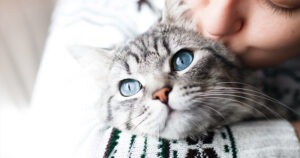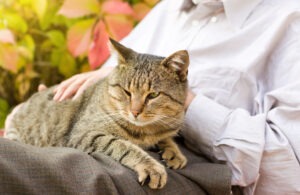If you plan to adopt a cat, the first thing you need to decide is whether you will adopt a kitten or an older cat. This is a very important decision, and it isn’t one that should be made lightly.
Before you decide, you should understand the pros and cons of adopting a senior cat. This will give you the information that you need to determine the age of the cat that would be a better fit for your family.

Table of Contents
Reasons Why You Should Adopt a Senior Cat
There are a few reasons why an adult cat could be the best fit for your family.
Lower energy level
Senior cats are much calmer and more relaxed than kittens. You won’t need to worry about a senior cat jumping up on the drapes and pulling them down. You also won’t need to worry about your cat jumping on the table or counter and knocking everything down. Senior cats are happy relaxing in your home and cuddling up against you.
Established personality
If you adopt a kitten, you have no idea how it will behave when it gets older. You won’t know if the kitten doesn’t like children or other animals until it is too late. Senior cats are already set in their ways. Their personality has developed, and the previous owner can let you know everything about the cat’s personality before you take it home. This will prevent unwanted surprises a month or a year down the road.
Lower cost
Adopting an older cat can be less expensive than a kitten, which may be surprising. Most older cats have already been spayed or neutered, and they will have already had the necessary vaccines as a kitten. All you would need to do when you get your senior cat is pay for the annual booster shots. If you plan to adopt a cat from a shelter, they may be willing to waive the adoption fee if you choose a senior cat.
Life experience
Senior cats have life experience. This makes them more tolerant of other animals and young children. Also, older cats are more independent than kittens, and they won’t need as much attention.
Your cat won’t grow anymore
When you adopt a senior cat, they will already be full-grown. This will let you know exactly how much cat you are getting. This is not something you will know when you adopt a kitten.
Easy training
Unlike kittens, senior cats have impulse control and an attention span. This will allow you to easily train the senior cat, which isn’t always possible if you have a kitten.
Reasons Why You Shouldn’t Adopt a Senior Cat

While there are plenty of great reasons to adopt a senior cat, there are also some downsides.
Less time
If you adopt a senior cat, you won’t have as much time together as you would if you were to adopt a kitten. A senior cat will have less time on this earth, meaning that you will have to say goodbye sooner than you would if you adopted a kitten.
Special needs
As a cat gets older, their medical needs and diet can change. Older cats are more prone to health conditions and skin conditions that may require expensive medication.
Decide Now? What To Expect When Adopting a Senior Cat?

If you are leaning toward adopting a senior cat rather than a kitten, it is essential that you know what to expect. You don’t want to bring your cat home and find that it is more than you can handle.
Shyness
It isn’t uncommon for your senior cat to be shy and hide for a while after bringing them home. It can be a couple of days before the cat starts to warm up to you and your family.
Shunning food
Your senior cat may not want to each much after bringing them into your home. The new surroundings will make your cat nervous, which can make them lose their appetite. If you offer the cat some tasty treats, it will help them warm up to having a meal.
Less mobile
Your senior cat will be less mobile than a kitten or a younger cat, so you will need to make the necessary adjustments. If you keep the cat food up off the floor, make sure that the cat can easily get to the dishes. Also, it is best to use a low-sided litter box, so the cat has no problem getting inside.
Your cat’s area
It is important that your senior cat has its own little area in the house. Set up a warm bed in a quiet area so your cat can get away when they need quiet time.
Age-related health issues
Because your cat is older, it isn’t uncommon for them to deal with age-related health issues such as decreased mobility, hearing or vision loss, and stiff joints. It is best to take your senior cat to the vet right after you adopt them so you will know exactly what health issues to expect.
They are set in their ways
Your senior cat will already be set in their ways, and they will know what they like and what they don’t. For example, if your cat doesn’t like a covered litter box, don’t force them to use the cover. If your cat has a favorite food, keep feeding it to them. It would be best if you didn’t try to change these things because it will only cause your cat stress.
How Old Is a Senior Cat?
A cat would be considered a senior cat from the ages of 11 to 14. When a cat reaches 15, it is considered a super-senior cat.
Do Older Cats Adjust To New Owners?

The answer to his question is yes, but you are going to have to work for it.
When you first bring your senior cat home, they will often hide. When they do come out to eat, they might not want anything to do with you.
If you are patients and gentle and give your cat space when they want it, they will start to trust you. Soon, this trust will turn to bond and love.
It is best to speak to your cat in a soft and reassuring voice and let them come to you. When they do, pet them or scratch them under the neck. Over time, it will seem as though your senior cat was living with you their entire life.
Senior cats make great pets for some families but not great for others. It is best to understand the pros and cons of adopting a senior cat and its needs before making your decision.
